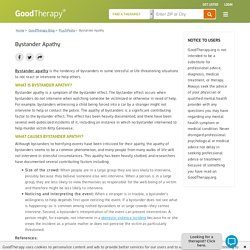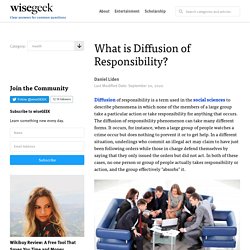

THE BYSTANDER EFFECT. Definition of Bystander Apathy. Bystander apathy is the tendency of bystanders in some stressful or life-threatening situations to not react or intervene to help others.

What Is Bystander Apathy? Bystander apathy is a symptom of the bystander effect. The bystander effect occurs when bystanders do not intervene when watching someone be victimized or otherwise in need of help. For example, bystanders witnessing a child being forced into a car by a stranger might not intervene to help or contact the police. The apathy of bystanders is a significant contributing factor to the bystander effect.
What Causes Bystander Apathy? Although bystanders to horrifying events have been criticized for their apathy, the apathy of bystanders seems to be a common phenomenon, and many people from many walks of life will not intervene in stressful circumstances. Size of the crowd: When people are in a large group they are less likely to intervene, possibly because they believe someone else will intervene. References: Tyrrell, M. Bystander Effect. What is Diffusion of Responsibility? Diffusion of responsibility is a term used in the social sciences to describe phenomena in which none of the members of a large group take a particular action or take responsibility for anything that occurs.

The diffusion of responsibility phenomenon can take many different forms. It occurs, for instance, when a large group of people watches a crime occur but does nothing to prevent it or to get help. In a different situation, underlings who commit an illegal act may claim to have just been following orders while those in charge defend themselves by saying that they only issued the orders but did not act. In both of these cases, no one person or group of people actually takes responsibility or action, and the group effectively "absorbs" it. There are several different sociological phenomena which fall into the category of diffusion of responsibility. Singaporean Eye Power (feat. Steven Lim) Untitled. Pluralistic Ignorance.
Pluralistic Ignorance Definition Pluralistic ignorance occurs when people erroneously infer that they feel differently from their peers, even though they are behaving similarly.

As one example, imagine the following scenario: You are sitting in a large lecture hall listening to an especially complicated lecture. After many minutes of incomprehensible material, the lecturer pauses and asks if there are any questions. No hands go up. You look around the room. Another case of pluralistic ignorance that is familiar to many college students concerns drinking on campus. Pluralistic Ignorance and Social Dynamics Pluralistic ignorance plays a role in many other dysfunctional social dynamics.
Pluralistic Ignorance and Social Norms Pluralistic ignorance begins with widespread conformity to social norms—norms that govern appropriate behavior in the classroom, at a party, in a boardroom, or in a hospital; norms that regulate behavior with friends, strangers, or colleagues. References: O’Gorman, H. How to Break the Bystander Effect. They could have left it to someone else. An Army veteran blocked a shooter in Oregon from entering his classroom. Three friends on a high-speed train from Paris to Amsterdam helped stop a gunman wielding an AK-47. This past spring, an Army captain in North Carolina pulled a couple to safety after a fiery car crash.
Were these men instinctively courageous, or had they learned to be? The Army captain (aptly wearing a Captain America T-shirt) credited his military training for knowing what to do and remaining calm. These heroes are dramatic examples. And this conundrum is not limited to thwarting terrorism or physically saving someone. But we often look the other way, like the priest and Levite in the Good Samaritan parable. The Bystander Effect The bystander effect is a phenomenon that occurs when individuals witness someone in trouble, but don’t offer help. Causes of the Bystander Effect Fear and Uncertainty: Sometimes, it’s not easy to tell if intervention is needed. We seek guidance. Bystander effect: Training in skills makes people more willing to help, Letters in Print News.